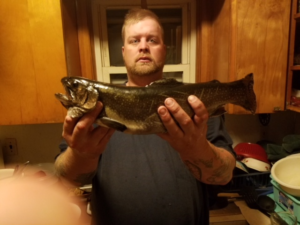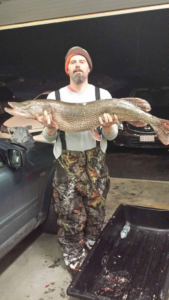Each year, MassWildlife recognizes anglers who catch exceptional freshwater fish in waters open to the public. If you submit the largest or longest fish in an eligible species category, you will get a gold pin and a plaque, and you’ll also be honored in a MassWildlife awards event.
Log onto https://www.mass.gov/service-details/gold-pin-winners to see all of the 2017 winners in the Adult Catch & Keep, Youth Catch & Keep and Catch & Release categories. You will notice that there were 6 gold pins awarded to local anglers or fish caught out of local waters.
In a ceremony held at the MassWildlife Field Headquarters in Westborough, MA on Saturday, March 17, the lucky anglers received gold pins and plaques commemorating their great feats.
Winners from our area were as follows:
Adult catch & keep category: Brook Trout, 3 lbs, caught out of Laurel Lake by Andrew Bostwick of North Adams; Northern Pike, 29 lbs 10 oz, caught out of Cheshire Reservoir by Kevin Janis of Pittsfield.
Youth catch & keep category: Chain Pickerel,4 lbs 11 oz, caught out of Lake Buel in Monterey by Mario Daniele of Wilbraham, MA; Crappie, 2 lbs, caught out of Onota Lake by Caedin Ostellino of Lanesborough.
Catch & release gold pin winners: Brook Trout, 19 inches, caught out of Lake Buel by Nicholas Hutline of Granville, MA; Northern Pike, 45.50 inches caught out of Onota Lake by Ashley DePaoli of Stamford, VT.
2017 Angler of the Year award winners
The Catch & Keep Angler of the Year Award is given to the person who weighs in the largest number of species that meet the minimum weight requirements for the previous calendar year. The award promotes awareness of the Commonwealth’s underutilized fish species and recognizes an angler’s ability to catch a wide variety of trophy species.
The Catch & Release Angler of the Year Award is awarded to the person who submits the largest number of species that meet the minimum length requirements for the previous calendar year.
This year the winners were:
Adult Catch & Keep Category: Mark Mohan, Jr. of Pembroke, MA. Mohan received State pins for the following species of fish: Bowfin, Brown Trout, Carp, Chain Pickerel, Crappie, Lake Trout, Northern Pike, Shad, Sunfish, Walleye, White Catfish and Yellow Perch. He also won the Adult Catch & Keep title in 2015, 2014 and 2013.
Youth Catch & Keep Category: Jason Bunar of Kingston, MA. He received State pins for the following fish species: Bowfin, Brook Trout, Brown Trout, Bullhead, Carp, Chain Pickerel, Channel Catfish, Crappie, Lake Trout, Landlocked Salmon, Largemouth Bass, Northern Pike, Rainbow Trout, Shad, Smallmouth Bass, Sunfish, Tiger Trout, Walleye, White Catfish, White Perch and Yellow Perch. He also won that title in 2016.
Catch & Release Angler Category: Michael Nee of Northborough, MA. Michael received state pins for the following species of fish: Bowfin, Brook Trout, Brown Trout, Bullhead, Carp, Chain Pickerel, Channel Catfish, Crappie, Lake Trout, Landlocked Salmon, Largemouth Bass, Northern Pike, Rainbow Trout, Shad, Smallmouth Bass, Sunfish, Tiger Trout, Walleye, White Catfish, White Perch and Yellow Perch. He also won that title in 2016 and 2015.
These anglers are amazing! They just didn’t catch the above species of fish, but the fish had to be of sizes to earn at least bronze pins. For example, for a largemouth bass to qualify, it had to be at least 7 lbs in the adult catch & keep category, at least 4 lbs in the youth category and at least 21 inches in the Catch & Release. Most anglers that I know are lucky to have caught a couple of pin fish in their entire lifetimes!
New State record fish caught in 2017 were as follows:
Catch & Keep Category:
Bowfin: 8 lbs, 1 oz caught out of the Taunton River in Taunton by David Souza of Berkley, MA. Two days later, his son Jake Souza also caught a fish of identical size and tied the record. (Those catches were featured in this column of September 3, 2017, “State record bowfin caught …TWICE”)
Catch & Release Category:
Bowfin: 29.50 inches out of Taunton River by Michael Nee of Northborough.
Brook Trout: 19 inches caught out of Lake Buel, Monterey by Nicholas Hutline of Granville, MA. Also, a same sized brookie was caught out of Fort Pond in Lancaster, MA by Ryan Gorman of Leominster, MA.
Channel Catfish: 31 inches caught out of the Connecticut River in Agawam, MA by Paul Beauchesne, Jr. of Worcester, MA.
Crappie: 17.25 inches caught out of the Connecticut River in Greenfield by Jeff Magnan of Gardner, MA.
Largemouth Bass: Two 25-inch fish, both caught out of Mashpee-Wateby Pond, Mashpee, one by John Gonsalves of Norton, MA and the other caught by Dylan Towne of West Wareham, MA.
Northern Pike: 45.50 inches caught out of Onota Lake in Pittsfield by Ashley DePaoli of Stamford, VT.
Shad: 25.25 inches caught out of the Chicopee River in Granby, MA by Paul Beauchesne, Jr. of Worcester, MA.
Smallmouth Bass: 22.50 inches caught out of Wachusett Reservoir by Marc Mahoney of Shrewsbury, MA.
Walleye: 28 inches caught out of the Connecticut River in Turners Falls by Mark Mohan, Jr. of Pembroke, MA.
White Perch: 17.25 inches caught out of Wachusett Reservoir by Prince Dukuly of West Boylston, MA.
A hearty, hearty congratulations to all!
A talk on the Deerfield River
This Wednesday evening, at the Berkshire Hills Country Club, 500 Benedict Rd., Pittsfield, the Taconic Chapter of Trout Unlimited will be having Michael Vito, Vice-President of the Deerfield River Chapter TU as its guest speaker. Mike’s presentation will be on the ongoing Deerfield River Wild Brown Trout Spawning Study.
If you are not familiar with that study, last November the group claims to have found over 90 redds on the Deerfield River below Fife Brook Dam. Many skeptics had previously proclaimed that these wild trout were coming from the tributaries and not from the main stem of the Deerfield. Well, apparently this group has proven them wrong. This might be worthwhile to stop in to hear what Mike has to say.
There will be a social hour starting at 5:30 PM followed by Mike’s presentation. (There will be no meal as the kitchen is closed this time of year). The presentation is free and open to the public. Contact Taconic TU President Henry Sweren at (413)822-5216 for more information.
Protecting our critters
In the 1950s, the pesticide DDT eliminated peregrine falcons from Massachusetts. In 1984, the MA Natural Heritage & Endangered Species Program (NHESP) began releasing young peregrines to restore the population. By 1987, the first successful pair nested on the Custom House Tower in Boston. Today, NHESP monitors nests, bands chicks, and improves nesting success with nest boxes. Over the past 31 years since their restoration, at least 646 wild-born chicks are known to have fledged in Massachusetts. You can support NHESP and efforts like this to help rare species by donating on Line 33A of your MA State Tax return. ( mass.gov/nhesp)
The List of Endangered, Threatened, and Special Concern species totals 427 native plant and animal species and are protected under the Massachusetts Endangered Species Act (MESA). They include 14 mammals, 27 birds, 15 reptiles, 4 amphibians, 10 fish, 99 non-marine invertebrates and 258 plants.
All money donated to the Endangered Species Program on the State tax return, goes into a dedicated fund. Money from this dedicated fund can only be used by the NHESP, which focuses its work on our state’s rare species. You can learn more about this program here: https://www.mass.gov/…/masswildlifes-natural-heritag.
Bill to Advance Hunter Recruitment and Retention
Recently, The Boone and Crockett Club extended its full support of a new House bill that seeks to advance hunter recruitment and retention. The Modernizing Pittman-Robertson Fund for Tomorrow’s Needs Act of 2017 (H.R. 2591) will provide technical and financial assistance to states for promoting hunting and recreational shooting.
The bill, introduced by Georgian Congressman Austin Scott (GA-08) would allow state fish and wildlife agencies the flexibility they need to address the declining number of hunters by using existing funds from the Pittman-Robertson Wildlife Restoration Fund to increase hunting and recreational shooting opportunities. The bill will also serve to clarify that one of the purposes of these funds is to provide financial and technical assistance to the states for hunter recruitment and retention, hunter education programs, and education programs to the non-hunting public.
“When the Boone and Crockett Club helped draft and get the Pittman-Robertson Act passed by Congress in 1934, we had lots of hunters and game populations were still recovering,” said Ben B. Hollingsworth Jr., president of the Boone and Crockett Club. “Today, game is abundant once again, but declining hunter participation means declining funds. This bill is the right thing to do at the right time to ensure healthy wildlife and ecosystems into the future.”
The Pittman-Robertson Act charges sportsmen an excise tax on the purchase of sporting arms and ammunition. These funds are distributed annually to state fish and wildlife agencies for wildlife and habitat conservation programs. Plans for what to do with the money must be submitted to and approved by the Secretary of the Interior. Acceptable options to date include research, surveys, management of wildlife and/or habitat, and acquisition or lease of land. Once a plan has been approved, the state must pay the full cost and is later reimbursed for up to 75 percent of that cost through P-R funds. The 25 percent of the cost that the state must pay generally comes from its hunting license sales. As of 2010, more than two billion in P-R dollars have been collected and distributed to states.
“In its day, Pittman-Robertson addressed the challenges of funding critical conservation work,” Hollingsworth Jr. explained. “The challenge of today is keeping these funds coming. Without sportsmen and new hunters coming in, the challenge will be greater.”
Conservation funding is based on a user-pay, public-benefit model. Those who value and use the resource pay for its care.
“Sportsmen have taken the responsibility of footing the bill for wildlife and the habitats they depend upon for everyone’s benefit,” Hollingsworth Jr. concluded. “Choosing to tax themselves in the midst of the Great Depression should tell you something about the character and commitments of hunters.”
